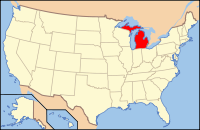Cass County, Michigan
| Cass County, Michigan | ||
|---|---|---|
|
||
 Location in the U.S. state of Michigan |
||
 Michigan's location in the U.S. |
||
| Founded | 1829 | |
| Named for | Lewis Cass | |
| Seat | Cassopolis | |
| Largest city | Dowagiac | |
| Area | ||
| • Total | 508 sq mi (1,316 km2) | |
| • Land | 490 sq mi (1,269 km2) | |
| • Water | 18 sq mi (47 km2), 3.6% | |
| Population | ||
| • (2010) | 52,293 | |
| • Density | 107/sq mi (41/km²) | |
| Congressional district | 6th | |
| Website | www |
|
Cass County is a county in the U.S. state of Michigan. As of the 2010 census, the population was 52,293. Its county seat is Cassopolis.
Cass County is included in the South Bend–Mishawaka, IN-MI, Metropolitan Statistical Area which has a total population of 316,663 and is sometimes considered part of Greater Michiana. Cass County has numerous lakes and is popular for fishing and boating.
The county is named for Lewis Cass, the Michigan Territorial Governor at the time the county was created in 1829. Cass later served as the United States Secretary of War under President Andrew Jackson, thus making a case for including Cass County as one of Michigan's "cabinet counties".
Cass County was not as heavily forested and had more fertile prairie land than other nearby areas of Michigan, and thus during early settlement it grew more rapidly in population. As early as 1830, a carding mill was started in the county on Dowagiac Creek, a branch of the St. Joseph River. Although the Sauk Trail (Chicago Road) passed through the southern part of the county, early settlement did not come primarily from eastern Michigan. Instead, settlers from Ohio and Indiana who had heard of the prairie lands came to occupy them, reaching the Michigan Territory over a branch of the Chicago Road leading from Fort Wayne, Indiana. The population of Cass County was over 3,000 by 1834.
...
Wikipedia

